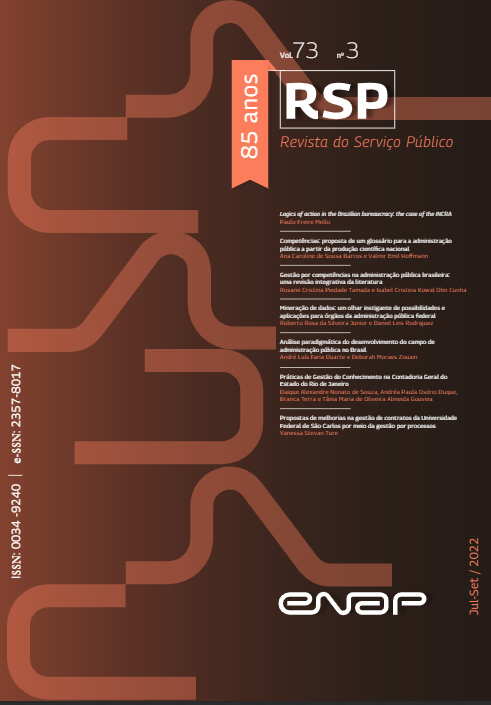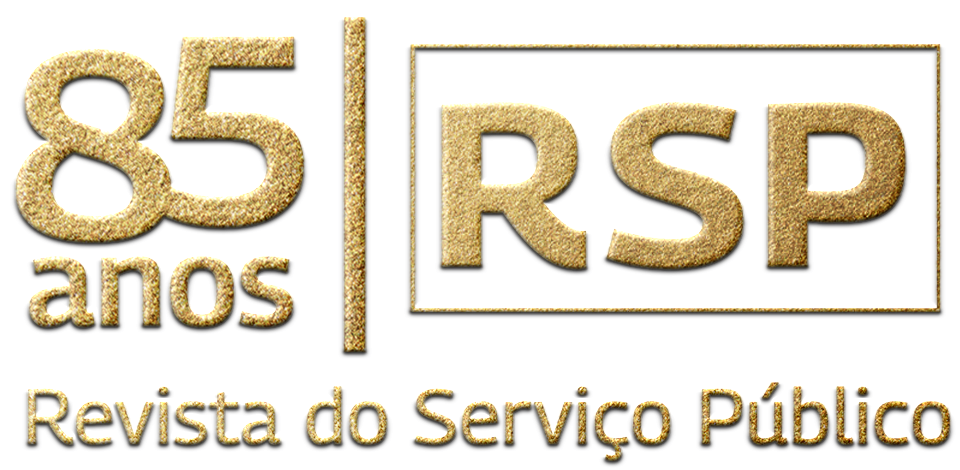Logics of action in the Brazilian bureaucracy
the case of the INCRA
Keywords:
bureaucracy, clientelism, team spirit, public service, neopatrimonialismAbstract
In order to assess the most prevalent logics of action in the Brazilian land agency, INCRA, we focus on the administrative processes of development and education partnerships, management reports, control bodies, documents of many superintendencies, and ethnography of bureaucracy in two of the 30 superintendencies. Were build typologies and evaluate the actions, discourses, and loyalty chains of strategic groups in the dispute arena. As a result of the overlapping of non-universalistic logics of action – like neo-patrimonialism, clientelism, team spirit – with universalistic logics, we observe a low delivery of goods and services to society. Despite a discourse emphasizing a lack of personnel and resources, the settlement titling, an institutional priority that doesn't need a lot of resources to be completed, shows the management difficulties. In order to change this situation, a better understanding of the action logics that inform them is necessary. This article tries to bring to light the hidden mechanisms of bureaucratic practice.
Downloads
References
ADVOCACIA GERAL DA UNIÃO (AGU). (2019). Representação TC 001.526/2017-0.
BERNSTEIN, A., & MERTZ, E. E. (2011). Introduction: Bureaucracy: Ethnography of the State in everyday life. PoLAR, 34(1), 6-10.
BERSCH, K., PRAÇA, S., & TAYLOR, M. M. (2013). State capacity and bureaucratic autonomy within National States: Mapping the archipelago of excellence in Brazil. Working paper prepared for the Latin American Studies Association Conference, 2013. Washington D.C.
BIERSCHENK, T. (2018). Commentary: ethnography, critique and the state. Some thoughts on “fiscal anthropological insights into the heart of contemporary statehood”, The Journal of Legal Pluralism and Unofficial Law, 50(3), 396-401.
BIERSCHENK, T., & OLIVIER DE SARDAN, J. P. (2019). How to study bureaucracies ethnographically? Critique of Anthropology, 0(0), 1-15.
BLUNDO, G. (2014). Seeing Like a State agent: The ethnography of reform in Senegal’s forestry services. In: BIERSCHENK, T., & OLIVIER DE SARDAN, J. P. (Orgs.). States at work: dynamics of African bureaucracies. Africa-Europe Group for Interdisciplinary Studies. 12, 69-90.
BOISSEVAIN, J. (1987). Apresentando amigos de amigos: redes sociais, manipuladores e coalizões. In: FELDMAN-BIANCO, B. (Org.). Antropologia das sociedades contemporâneas: métodos. São Paulo, Global: 127-215.
BOURDIEU, P. (2011). O campo político. Revista Brasileira de Ciência Política. Brasília, 5, 193-216.
BOURDIEU, P. (2013). O senso prático. Petrópolis. Vozes.
BOURDIEU, P. (2014). Sobre o Estado. Ed. Cia das Letras.
BOURDIEU, P. (2017). Homo academicus. Florianópolis. Ed. UFSC.
BRESSER-PEREIRA, L. C. (2007). Burocracia pública e Estado no Brasil. Revista Eletrônica sobre a Reforma do Estado (RERE), Salvador, IBDP, 11.
CAVALCANTE, P., LOTTA, G. S., & OLIVEIRA, G. (2018). Do insulamento burocrático à governança democrática: As transformações institucionais e a burocracia no Brasil. In: PIRES, R.; LOTTA, G. S., & OLIVEIRA, V. D. (Orgs.). Burocracia e políticas públicas no Brasil: interseções analíticas. Brasília. IPEA. ENAP: 59-84.
CORADINI, O. L. (2003). As missões da “cultura” e da “política”: confrontos e reconversões de elites culturais e políticas no Rio Grande do Sul (1920-1960). Estudos Históricos, 32, 125-144.
CORADINI, O. L. (2018). Os professores de ensino superior como objeto de estudo e a “sociologia prática”. Política & Sociedade, v 17, n. 38, p. 191-223.
CROZIER, M. (1981). O fenômeno burocrático: Ensaio sobre as tendências burocráticas dos sistemas de organização modernos e suas relações, na França, com o sistema social e cultural. Brasília. Ed. UNB.
FUKUYAMA, F. (2013). What is governance? CGD Working Paper 314. Washington, DC: Center for Global Development.
FUNDER, M. (2019). The state as a person: The role of interface bureaucrats in everyday natural resource governance. In: FIONA NUNAN (Org.). Governing renewable natural resources. Routledge.
GEERTZ C. (1997). O saber local: novos ensaios em antropologia interpretativa. Petrópolis. Vozes.
GOFFMAN, E. (1974). Manicômios, prisões e conventos. Ed. Perspectiva.
GOMIDE, A., PEREIRA, A. K., & MACHADO, R. Burocracia e capacidade estatal na pesquisa brasileira. In: PIRES, R., LOTTA, G. S., & OLIVEIRA, V. D. (Orgs.). (2018). Burocracia e políticas públicas no Brasil: interseções analíticas. Brasília. IPEA. ENAP, p. 85-104.
GRAZIANO, L. (1975). A conceptual framework for the study of clientelism. New York, Cornell University.
GRINDLE, M. S. (2010). Good governance: The inflation of an idea. CID Working Paper, 202, Center for Internacional Development of Harvard University.
HELAL, D. H., & NEVES, J. A. B. (2010). Burocracia e inserção social: uma proposta para entender a gestão das organizações públicas no Brasil. Sociologias, Porto Alegre, 12(25), 312-340.
HEYMAN, J. (2012). Deepening the Anthropology of Bureaucracy. Anthropological Quarterly. JSTOR, 1269-1277.
HOAG, C., & HULL, M. (2017). A review of the anthropological literature on the civil service. Policy Research Working Paper 8081.World Bank Group.
JOBERT, B., &; MULLER, P. (1989). L’Etat en action: politiques publiques et corporatismes. Paris. PUF.
LANZANO, J. E., & SCHMITTER, P. C. (1998). El fin del siglo del corporativismo. Nueva Sociedad. Caracas.
LIPSKY, M. (1980). Street level bureaucracy: dilemmas of the individual in public services. New York, Russel Sage Publications Foundation.
MEEK, D. (2014). Movements in education: The political ecology of education in the Brazilian Landless Workers’ Movement (Doctoral dissertation). University of Georgia.
MELLO, . Pobreza e desigualdade na reforma agrária: o caso dos assentamentos rurais no Brasil. Germany, OmniScriptum GmbH &Co. KG.
MELLO, P. F. (2020). Lógicas de ação no serviço público: Uma análise plural do INCRA. Porto Alegre.
MUIR, S., & GUPTA, A. (2018). Rethinking the anthropology of corruption: an introduction to Supplement 18. Current Anthropology, 59, Supplement 18.
OLIVIER DE SARDAN, J. P. Abandoning the neo-patrimonialist paradigm. For a pluralist approach to the bureaucratie mode of governance. In: KOECHLIN, FORSTER (Orgs.). The politics of governance: Actors and articulations in Africa and beyond. Routledge, 75-91, 2014.
OLIVIER DE SARDAN, J. P. (2015). Practical norms: informal regulations within public bureaucracies in Africa and Beyond. In: HERDT, T. D., & OLIVIER DE SARDAN, J. P Real governance and pratical norms in Sub-Saharan Africa: The game of the rules. London. Routledge, 19-62.
PETERS, B. G. (1999). La política de la burocracia. México. Colegio Nacional de Ciencias Políticas y Administración Pública.
PIRES, R., LOTTA, G. S., & TORRES JÚNIOR, R. D. (2018). Burocracias implementadoras e a (re)produção de desigualdades sociais: Perspectivas de análise no debate internacional. In: PIRES, R., LOTTA, G. S., & OLIVEIRA, V. D. (Orgs.). Burocracia e políticas públicas no Brasil: Interseções analíticas. Brasília. IPEA. ENAP, 247-266.
POLGA-HECIMOVICH, J., & TRELLES, A. (2016). The organizational consequences of politics: A research agenda for the study of bureaucratic politics in Latin America. Latin America Politics in Society, 58(4), 56-79.
RAMOS, C., CASA, M., & MILANESI, A. (2018). Los servicios civilies brasileño y uruguayo: Un análisis comparado de sus desarrollos y desafíos. Brasília: Enap. Flacso Brasil.
SABOURIN, E. (2020). Clientelismo e participação nas políticas públicas de desenvolvimento rural no Brasil. Revista de Economia e Sociologia Rural, 58(4), e217798.
TENDLER, J. (1998). Bom governo nos trópicos: Uma visão crítica. Rio de Janeiro. Revan. Brasília. ENAP.
TOURAINE, A. (1989). Palavra e sangue: Política e sociedade na América Latina. São Paulo. UNICAMP.
TRIBUNAL DE CONTAS DA UNIÃO (TCU). (2018). Processo 010.348/2018-2. Disponível em: https://portal.tcu.gov.br/. Acesso: 13 mar. 2019.
TRIBUNAL DE CONTAS DA UNIÃO (TCU). (2019). Acórdão 1043/2019. Disponível em: https://portal.tcu.gov.br/ Acesso: 20 mai. 2019.
WEBER, M. (1971). Ensaios de sociologia. Rio de Janeiro. Zahar.
WOLF, E. Parentesco, amizade e relações patrono-cliente em sociedades complexas. In: FELDMAN-BIANCO, B., & RIBEIRO, G. L. (Orgs.).(2003). Antropologia e poder. Brasília. UNB, 93-113.
ZUVANIC, L, IACOVIELLO, M., & GUSTA, A. L. R. (2010). The weakest link: the bureaucracy and civil service systems in Latin America. In: SCARTASCINI, C., STEIN, E., & TOMMASI, E. (Orgs.). How democracy works: political institutions, actors, and arenas in Latin American policymaking. Inter-American Development Bank David Rockefeller Center for Latin American Studies, Harvard University, 147-176.
Downloads
Published
How to Cite
Issue
Section
License
Copyright (c) 2022 Revista do Serviço Público

This work is licensed under a Creative Commons Attribution-NonCommercial-ShareAlike 4.0 International License.
- A RSP adota a licença Creative Commons (CC) do tipo Atribuição – Uso Não-Comercial (BY-NC).
- A licença permite que outros remixem, adaptem e criem obra licenciada, sendo proibido o uso com fins comerciais.
- As novas obras devem fazer referência ao autor nos créditos e não podem ser usadas com fins comerciais, porém não precisam ser licenciadas sob os mesmos termos dessa licença.
- Ao publicar o artigo na RSP, o autor cede e transfere para a ENAP os direitos autorais patrimoniais referentes ao artigo.
- O artigo publicado na RSP não poderá ser divulgado em outro meio sem a devida referência à publicação de origem.
- O autor que tiver o artigo publicado na RSP deverá assinar o Termo de Concessão de Direitos Autorais (em momento oportuno a editoria da Revista entrará em contato com o autor para assinatura do Termo).



